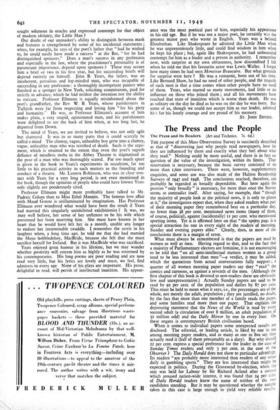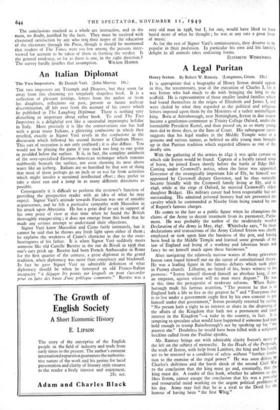The Press and the People
THE purpose of this Mass Observation Survey is succinctly described as that of " discovering just why people read newspapers, how far they are influenced by them and exactly what they feel about what they read." Nothing could be more useful, and there is in fact no question of the value of the investigation, within its limits. That reservation is necessary, because the basic survey consisted of no more than 1,6cro interviews. There were, however, supplementary enquiries, and some use was also made of the Hulton Readership Surveys of 1947 and 1948. The conclusions reached, therefore, can probably be regarded as broadly dependable. But here again the proviso "only broadly" is necessary, for more than once the Survey seems to contradict itself. After saying, for example, that " though the majority of people look at the political news, it is only to glance at it," the investigators report that, when they asked readers what part of their morning paper they remembered best on a particular day, no fewer than 38 per cent. mentioned news items (many of them, of course, political), against (incidentally) i t per cent. who mentioned sporting items. Yet it is affirmed later on that " the sports pap. is a special attraction for one in every eight of the readers of morning, Sunday and evening papers alike." Clearly, then, in most of the conclusions there is a margin of error.
What must always be remembered is that the papers are read by women as well as men. Having regard to that, and to the fact that a majority of Parliamentary electors are feminine, it is not encouraging to be told that "on all semi-intellectual matters women as a group tend to be less interested than men "—a verdict, it may be added, which the quotations from actual conversations fully support ; a quarter of all women morning paper readers say they " read " the comics and cartoons, as against a seventh of the men. (Although the first chapter of this book is devoted to non-readers these are obviously few and unrepresentative.) Actually Sunday papers arc said to be read by 92 per cent. of the population and dailies by 87 per cent. This must be held to mean what it says, i.e., the percentages arc of the whole, not merely the adult, population ; they are justified, no doubt, by the fact that more than one member of a family reads the paper, and some families read more than one paper. That explains the depressing statement that the News of the World is read by every second adult (a circulation of over 8 million, an adult population of 32 million odd) and the Daily Mirror by one in every four. On these organs is contemporary British civilisation based. When it comes to individual papers some unexpected results are disclosed. The editorial, or leading article, is liked by one in ten among morning paper readers, and as many as one in five say they actually read it (half of them presumably as a duty). But why should 22 per cent. express a special preference for the leader in the case of Sunday Times readers and only 3 per cent. in the case of the Observer ? The Daily Herald does not show to particular advantage. Its readers "are probably more interested than readers of any other daily in gambling sports." They are less interested than might be expected in politics. During the Gravesend by-election, when the seat was held for Labour by Sir Richard Acland after a contest which aroused nation-wide interest, it was found that 24 per cent. of Daily Herald readers knew the name of neither of the two candidates standing. But it may be questioned whether the sample taken in this case is large enough to yield very reliable results. The conclusions reached as a whole are instructive, and in the main, no doubt, justified by the facts. They must be received with chastened satisfaction by any who resk their hopes of the education of the electorate through the Press, though it should be mentioned that readers of The Times were too few among the persons inter- viewed for account to be taken of them in framing the verdict. Is the general tendency, so far as there is one, in the right direction ?
The survey hardly justifies that assumption. WILSON HARRIS.



































 Previous page
Previous page